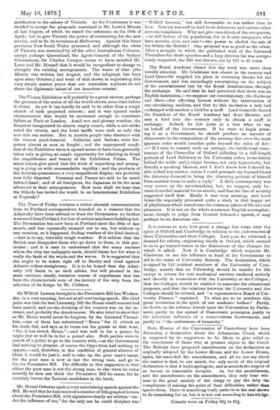The Royal Academy dinner this day week was more than
usually amusing. Mr. Gladstone was absent iu the country and Lord Granville supplied his place in returning thanks for the Government, and was exceedingly entertaining on the subject of the entertainment lost by the Royal Academicians through the exchange. He said that he had perceived that there was an English institution,—we suppose our contemporary, the Exchange and Mart ,—for effecting barters without the intervention of any circulating medium, and that by this mediation a lady had exchanged with another a bird for a muff. Lord Granville feared the President of the Royal Academy had done likewise, and sent a bird into the country only to obtain a muff in exchange. Indeed, he felt quite at a loss what to say on behalf of the Government. If he were to begin prais- ing it as a Government, he should produce an amount of chiaroscuro in the composition of the evening that even the most ignorant critic would consider quite beyond the rules of Art : —" If I were to commit such an outrage, the intellectual coun- tenance of the Chancellor of Oxford (alluding to a full-length portrait of Lord Salisbury in his University robes, immediately behind the noble earl,) might become, not only figuratively, but literally a speaking likeness, and I don't know how I should be able to find any answer, unless I could persuade my learned friend the Attorney-General to bring the charming portrait of himself from another room to make a reply." A daily contemporary was very severe on the speechmaking, but, we suppose, only be- cause it needed material for an article, and that the line of severity suggested itself first. Really it was very amusing, and Lord Granville especially presented quite a study in that happy art of playfulness which transforms the common-places of life into real pleasures. It is not on the whole a common English accomplish- ment, though to judge from General Schenck's speech, it may perhaps be an American one.


































 Previous page
Previous page